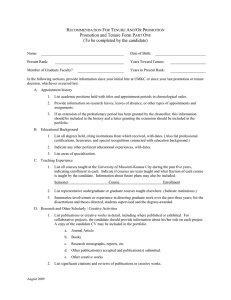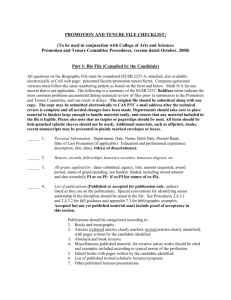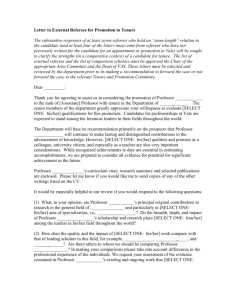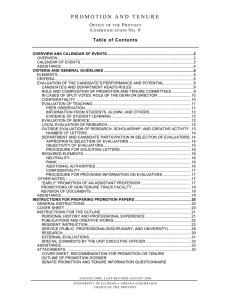Promotion and Tenure Guidelines Department of Mathematical Sciences October 2009 Teaching
advertisement
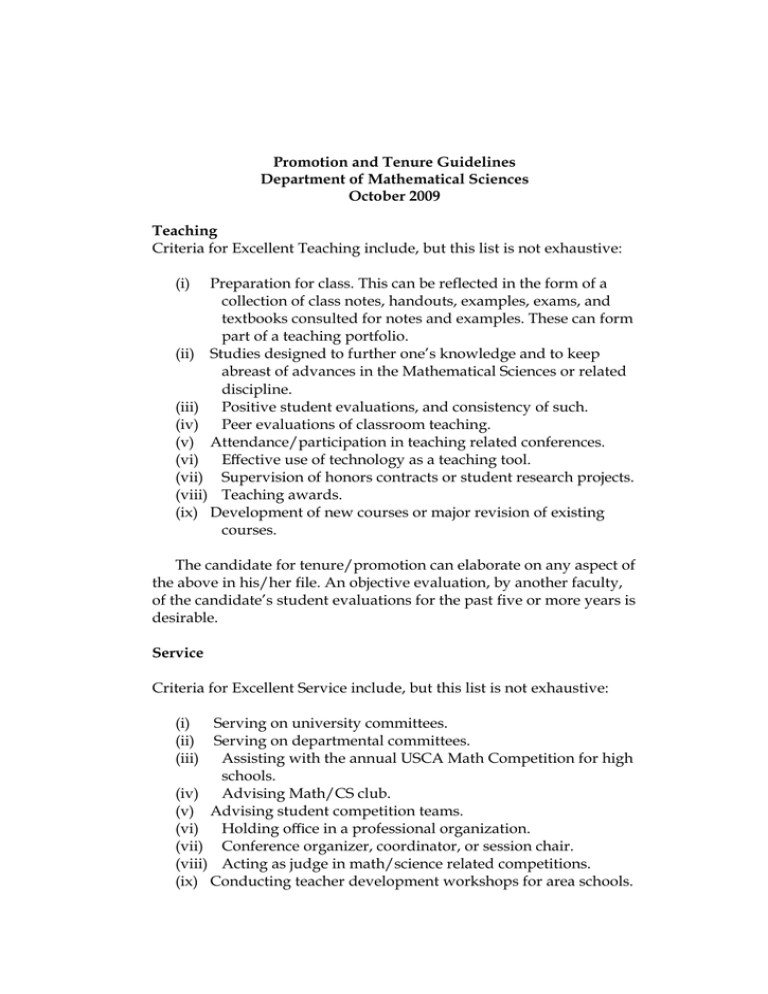
Promotion and Tenure Guidelines Department of Mathematical Sciences October 2009 Teaching Criteria for Excellent Teaching include, but this list is not exhaustive: (i) Preparation for class. This can be reflected in the form of a collection of class notes, handouts, examples, exams, and textbooks consulted for notes and examples. These can form part of a teaching portfolio. (ii) Studies designed to further one’s knowledge and to keep abreast of advances in the Mathematical Sciences or related discipline. (iii) Positive student evaluations, and consistency of such. (iv) Peer evaluations of classroom teaching. (v) Attendance/participation in teaching related conferences. (vi) Effective use of technology as a teaching tool. (vii) Supervision of honors contracts or student research projects. (viii) Teaching awards. (ix) Development of new courses or major revision of existing courses. The candidate for tenure/promotion can elaborate on any aspect of the above in his/her file. An objective evaluation, by another faculty, of the candidate’s student evaluations for the past five or more years is desirable. Service Criteria for Excellent Service include, but this list is not exhaustive: (i) Serving on university committees. (ii) Serving on departmental committees. (iii) Assisting with the annual USCA Math Competition for high schools. (iv) Advising Math/CS club. (v) Advising student competition teams. (vi) Holding office in a professional organization. (vii) Conference organizer, coordinator, or session chair. (viii) Acting as judge in math/science related competitions. (ix) Conducting teacher development workshops for area schools. The candidate for tenure/promotion can elaborate on the nature of his/her involvement in any of the above. Scholarship Criteria for Excellent Scholarship include, but this list is not exhaustive: (i) Publications in research journals. Both peer-reviewed and nonpeer-reviewed publications (either research or teaching) should be considered for tenure/promotion. Publications in interdisciplinary journals should be considered as equal to publication in mathematics or computer science journals, especially when the article concerns an application of mathematics or computer science. The length of the paper does not necessarily reflect the quality of the paper. It is not unusual for a quality Math/CS paper to be 3–15 pages long. The quality of the paper can be judged from the prestige of the journal in which it appears or by colleagues. (ii) Demonstration of a focused program of research. (iii) Publication in teaching journals. (iv) Conducting workshops at academic/professional conferences. (v) Presentations in teaching or research related conferences. (vi) Publication of research monographs, or chapters in such. (vii) Editor/reviewer of professional journal. (viii) Discipline-related consulting work. (ix) Publication of textbooks. (x) Application for grants and fellowships. The competitiveness of the fellowship or grant and the external or internal nature of the grant are important criteria for evaluation. Awarding of grant funding is indicative of the importance of the work. (xi) Technical reports in applied mathematics or computer science. (xii) Presentations in USCA Mathematical Sciences colloquia. The candidate for tenure/promotion can elaborate on any aspect of the above in his/her file. Letters from outside experts assessing the importance of your research can be quite effective. The candidate should include support letters from colleagues. [To this end interaction and talking with colleagues about teaching matters, and mathematical matters are helpful.]
